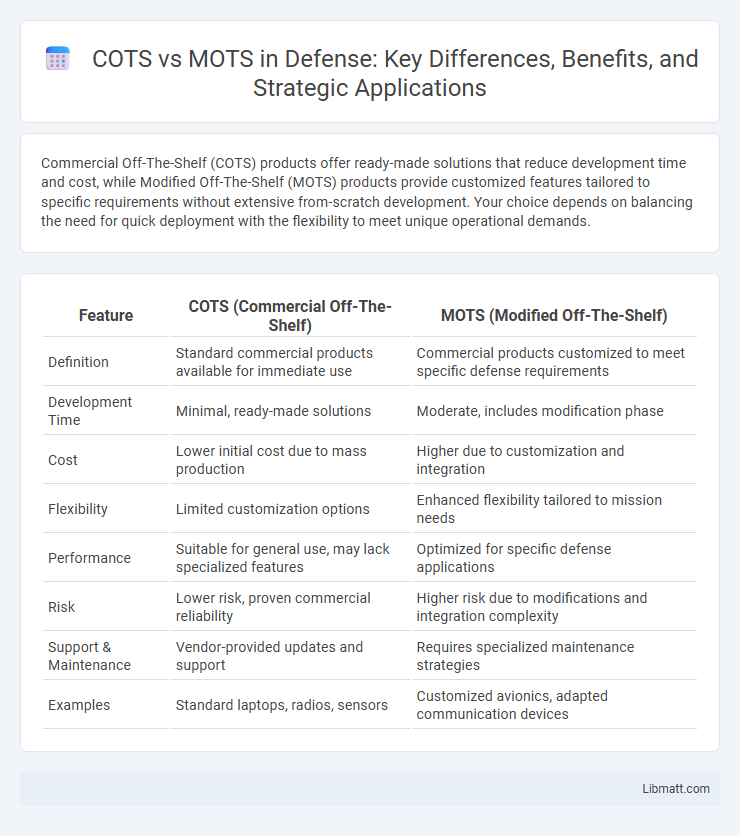Commercial Off-The-Shelf (COTS) products offer ready-made solutions that reduce development time and cost, while Modified Off-The-Shelf (MOTS) products provide customized features tailored to specific requirements without extensive from-scratch development. Your choice depends on balancing the need for quick deployment with the flexibility to meet unique operational demands.
Table of Comparison
| Feature | COTS (Commercial Off-The-Shelf) | MOTS (Modified Off-The-Shelf) |
|---|---|---|
| Definition | Standard commercial products available for immediate use | Commercial products customized to meet specific defense requirements |
| Development Time | Minimal, ready-made solutions | Moderate, includes modification phase |
| Cost | Lower initial cost due to mass production | Higher due to customization and integration |
| Flexibility | Limited customization options | Enhanced flexibility tailored to mission needs |
| Performance | Suitable for general use, may lack specialized features | Optimized for specific defense applications |
| Risk | Lower risk, proven commercial reliability | Higher risk due to modifications and integration complexity |
| Support & Maintenance | Vendor-provided updates and support | Requires specialized maintenance strategies |
| Examples | Standard laptops, radios, sensors | Customized avionics, adapted communication devices |
Introduction to COTS and MOTS
COTS (Commercial Off-The-Shelf) and MOTS (Modified Off-The-Shelf) are two common software procurement strategies used by organizations to optimize cost and efficiency. COTS solutions are ready-made products available for immediate use, while MOTS refers to COTS products that have been altered to better meet specific user requirements. Understanding the distinction between COTS and MOTS helps your organization select the right software approach based on customization needs and deployment timelines.
Defining COTS: Commercial Off-The-Shelf Solutions
Commercial Off-The-Shelf (COTS) solutions refer to ready-made software or hardware products available for immediate purchase and deployment, designed to meet common industry needs without customization. COTS products offer cost efficiency, faster implementation, and proven reliability by leveraging pre-developed technology widely adopted across sectors. These solutions contrast with custom-built or specialized options, providing organizations with scalable and supported tools that reduce development time and risk.
Understanding MOTS: Modified Off-The-Shelf Products
Modified Off-The-Shelf (MOTS) products are pre-existing commercial items adapted to meet specific user requirements, bridging the gap between fully custom solutions and standard Commercial Off-The-Shelf (COTS) products. By incorporating targeted modifications, MOTS solutions provide enhanced functionality or compliance while reducing development time and costs compared to bespoke systems. These tailored adaptations maintain the reliability and proven performance of the base product, making MOTS a strategic choice in industries like defense, aerospace, and technology.
Key Differences Between COTS and MOTS
COTS (Commercial Off-The-Shelf) products are pre-made, readily available solutions designed for general market use, while MOTS (Modified Off-The-Shelf) products are standard COTS items adapted or customized to meet specific needs. The key differences lie in customization level, integration complexity, and cost-effectiveness; COTS offers quick deployment and lower initial costs, whereas MOTS provides tailored functionality with additional development time. Your choice depends on balancing immediate usability with the necessity for specialized features and system compatibility.
Use Cases: When to Choose COTS or MOTS
COTS (Commercial Off-The-Shelf) solutions are ideal for businesses seeking ready-made software with proven reliability, rapid deployment, and lower initial costs, especially in common applications like CRM, ERP, and office productivity. MOTS (Modified Off-The-Shelf) products offer customization advantages, making them suitable for organizations requiring tailored features to meet specific industry regulations, unique workflows, or integration with existing legacy systems. Selecting between COTS and MOTS depends primarily on the balance between the urgency of implementation, budget constraints, and the necessity for specialized functionality.
Cost Implications: COTS vs MOTS
COTS solutions often present lower upfront costs due to mass production and widespread availability, making them cost-effective for standard applications. MOTS, while typically more expensive initially due to customization and specialized features, can reduce long-term expenses by better aligning with Your specific operational requirements and minimizing integration challenges. Evaluating total cost of ownership, including maintenance and upgrade costs, is crucial when choosing between COTS and MOTS for your project.
Customization and Flexibility Comparison
COTS (Commercial Off-The-Shelf) products offer limited customization, designed for broad market use with standard features that meet general requirements but restrict tailored adjustments. MOTS (Modified Off-The-Shelf) solutions provide enhanced flexibility by allowing modifications made to existing commercial products, striking a balance between ready-made functionality and bespoke customization. Organizations often prefer MOTS when project-specific adaptations are necessary without the extensive development time and cost of fully custom solutions.
Integration Challenges for COTS and MOTS
Integration challenges for COTS (Commercial Off-The-Shelf) and MOTS (Modified Off-The-Shelf) products often stem from compatibility issues with existing systems, leading to potential delays and increased costs. COTS solutions may require extensive customization or middleware to function seamlessly within your infrastructure, whereas MOTS involves additional modifications that can introduce complexity and maintenance overhead. Ensuring proper interoperability and system stability remains a critical concern during the integration phase for both COTS and MOTS implementations.
Security and Compliance Considerations
COTS (Commercial Off-The-Shelf) software often faces challenges in meeting stringent security and compliance standards due to its general-purpose design and limited customization options. MOTS (Modified Off-The-Shelf) solutions enable organizations to tailor security features and compliance controls to specific regulatory requirements such as GDPR, HIPAA, or FISMA, enhancing risk management capabilities. Implementing MOTS typically requires rigorous validation and testing to ensure that modifications do not introduce vulnerabilities or disrupt compliance frameworks.
Making the Right Choice: COTS vs MOTS
Choosing between COTS (Commercial Off-The-Shelf) and MOTS (Modified Off-The-Shelf) solutions depends on your project's flexibility and customization needs. COTS offers ready-made software or hardware with quick deployment and predictable costs, ideal for standard requirements. MOTS provides tailored modifications to existing products, balancing faster implementation with specific functionality enhancements to better fit your unique operational demands.
COTS vs MOTS Infographic

 libmatt.com
libmatt.com